I think a landing in Syria is the best possible idea. This coupled with an offensive by your troops in Kuwait could bring down the Arab portion of the Ottoman Empire. When your troops from Egypt, Mesopotamia and Syria join up you'll be able to stirke into Anatolia alongside the Russians and bring the down the Turks. With Ottoman pressure relieved from Russia the Eastern Front will at the veyr least hold whilst you will have large numbers of troops to use in either the Balkans or France.
The Great War (mod 1914)
- Thread starter Kurt_Steiner
- Start date
-
We have updated our Community Code of Conduct. Please read through the new rules for the forum that are an integral part of Paradox Interactive’s User Agreement.
You are using an out of date browser. It may not display this or other websites correctly.
You should upgrade or use an alternative browser.
You should upgrade or use an alternative browser.
The appointment of the Czar as head of the army in 1916 (?) was a horrible choice since he had neither the experience or tactical brilliance to help him.
The appointment of the Czar as head of the army in 1916 (?) was a horrible choice since he had neither the experience or tactical brilliance to help him.
He doesn't actually need those things. If you don't have them, have enough self perspective to admit it and appoint a subordinate who does.
He doesn't actually need those things. If you don't have them, have enough self perspective to admit it and appoint a subordinate who does.
Or you could take the Hitler Approach: convince yourself that victory is on the horizon and don't allow reality to say otherwise.
Chapter seventeen: Sailing to Byzantium.
Afterwards, even Asquith would agree that the most vicious figthing of the whole campaign took place in London. As Lord Fisher stuck to his guns and remained fixed in his conviction that the landings had to take place in Bokkum, his relation with Churchill worsened, as the First Lord of the Admiralty insisted on forcing the Dardanelles, which gave rise to bitter arguments among the two.
However, if Fisher's attitude blocked Churchill's Mediterranean expedition, he was also in troubles, as Kitchener remarked that he had no troops to spare for such an operation. When Fisher suggested using some of the Territorial divisions that were to be ready in Spring, he was blocked again, this time by Field Marshal French interjected and demanded that no extra troops be spared from the western front, insisting that the war would be won there. The stalemate was broken by Churchill, that pointed out that his operation did not need waiting for new troops to be ready but it can go on with part of the divisions already present in Egypt. Then the problem was that Kitchener was momentarily enrapted by the idea of attacking Germany in the flank and said that Fisher’s idea should not be discounted.
The debate continued for some time, with Admiral Jellicoe joining the fighting, as he opposed tsending the Grand Fleet to the Heligoland Bight to protect the invasion force because it would meant taking the fleet within close range of Germany, in danger of being ravaged by aubmarines, mines and torpedo attacks, something that would not be possible in the North Sea. In that juncture, Asquith tried desesperately to find some sort of compromise that satisfied all the parts implied. Finally, a compromise was reached: Churchill would allow for the planning of a Baltic campaign, and Fisher would let Churchill launch a limited naval campaign in the Dardanelles. The deal was accepted and Fisher began to study the chances of an amphibious assault on the German coast, which was to be presented at the next War Council meeting for consideration.
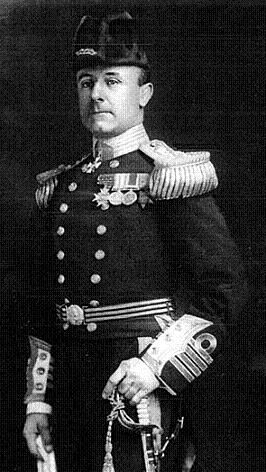
"Risking my battleships you say, sir? Bollocks, sir, utter bollocks!" From "Apocryphal memories of a Baldrick being in the Great War".
Meanwhile, as urgent telegram from St. Petersburg demanding inmediate action kept arrivign to London, the Dardanelles campagin had to be rushed forwards. It was a recipe for disaster.
It began on February 13th, 1915. It was Friday (1). The Mediterranean Fleet, reinforced by the battleship HMS Queen Elizabeth -to the great and mighty anger of Jellicoe-, under the command of Admiral Sir Frederick Tower Hamilton, GCVO, KCB, bombarded the Turkish artillery forts along the Dardanelles straits. Despite some damage sustained by ships engaging the Ottoman forts, minesweepers were ordered to proceed along the straits. Then, as the Ottoman guns remained in silence, disaster struck. The battlecruiser HMS Indomitable was heavily damaged by a mine, threatining to capsize. Then, the Turks opened fire again, raining shells over the minesweepers, which retreated leaving the minefields largely intact. The battlecruiser HMS Inflexible and the cruiser HMS Defence both sustained critical damage from mines, although there was confusion during the battle about the cause of the damage—some blamed torpedoes. A protected cruiser, the HMS Black Prince, sent to help the Irresistible, was itself struck by an explosion and had, in its turn, to be rescued. To keep pressing was sheer mandness and Admiral Hamilton decided to turn back.
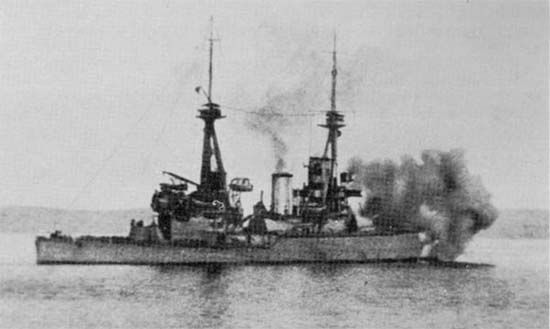
HMS Inflexible bombarding Turkish positions

Even if no ships were lost, the losses caused the abortion of any further attempts to force the straits by naval power alone. Losses had been anticipated during the planning of the campaign, so mainly obsolete battleships had been sent which were unfit to face the German fleet. However, many naval officers—including Admiral de Robeck and Lord Fisher—did not consider the losses acceptable. It was obvious that ground forces were necessary to eliminate the Turkish artillery.

A Turkish heavy gun. An 11 inch gun placed in a fortress at Kilitbahir
(1) I must confess that when I checked the day after selecting the date I burst out laughing like a Peti who has landed in Pizzaland.
[GAME NOTES: Thus, I've decided for the Dardanelles. I said that I was not to repeat all the Allies mistakes but something compelled me to try this. As you will see, I was not so willing to be trashed as in OTL, but this belong to the future... The damage on the ships here presented come from a mysterious event: suddenly the Mediterranean Fleet set sailing for the Adriatic wihout me ordering so (how amusing!) and met the Austrian fleet. I discovered that when I was looking at the current battles and, yikes!, I was able to extract them from that unrequested meeting. No one expects the Austrian Naval Inquisition, it seems. As said, the Baltic scheme as not been entirely forgotten.
BTW, now I see that a Hamilton did begin the Dardannelles scheme. How funny
@Razgriz: Well, fog of war... need to react fast... If you think that those mistakes were stupid, let's not mention the Dardanelles action here described.
@Enewald: That's the idea. I'll defend Britain by attacking!
@Nathan Madien: The problem is/was that none of those options promised any chance of success at that stage. If it was not logistics, there were the commanders in the field... Well, what will happen in this AAR? Keep tunned...
@Davout:
@FlyingDutchie: Well, there was some military sense in that. Landing in Northern Germany was to avoid the principal trench lines, for instance. And it was nearer to Berlin than Flanders.
@c0d5579;11747698: Me too, but I'm afraid that in this I feel slightly inclined to repeat Gallipoli, for sake of some historical need -Aussies and Kiwies (with all due respect and my complete and deepest sympathy for them) may wonder if there is such a need, of course, but, what would be Australia and New Zealand without Anzac Day? Think about poor Mel Gibson, for God's sake!
@StephenT: And Salonica was made possible by Gallipoli, so, which operation did won the war there?
@Tommy4ever: Me too, but, at time will solve, our boys in Kuwait and Egypt are quite resorceful...
@soulking;: Yes, that is a mistake that I'm afraid is going to be repeated here, unless Nicky is struck by a lightining or else...
@Porkman: But the Czar only talks about Imperial policies with God...
@Nathan Madien: "Erm... dear Nicky?"
"Yes, Alix?"
"Forgive me the interruption, but, even if we are winning the war, I see some Picklehaubes moving to our Winter palace, you see, my dear."
Last edited:
I have the feeling that this is going to be a bad idea...Gallipoli failed for a reason, I really don't want to see you make that mistake again.
Is this a Blackadder reference? Because it better be!From "Apocryphal memories of a Baldrick being in the Great War"
Meanwhile, as urgent telegram from St. Petersburg demanding inmediate action kept arrivign to London, the Dardanelles campagin had to be rushed forwards. It was a recipe for disaster.
It began on February 13th, 1914. It was Friday (1).
The British...they were in such a rush to get to the Dardanelles that they actually went back in time.
British ever-victorious navy never admits defeats.
Sure they do, they just then shoot the admiral in charge. You know, to encourage the others.
Now Kurt - why in God's name could the ANZACs not die somewhere else? Somewhere where they don't somehow make the poor Newfies suffer five times as many casualties from cold-weather injuries than from enemy contact? Do you know what it takes to make them suffer cold weather injuries at all, much less on a beach in Asia Minor?
British ever-victorious navy never admits defeats.
That's true. When the French chased off the Brits in the September 1781 Battle of Chesapeake Bay near Yorktown, the British didn't admit defeat. They simply began planning for Trafalgar.
Sigh. I know you are doing it for historical flavour but even at the time the Dardenelles campaign looked dodgy from the start. As Allenbrooke might say, it was the price they paid for having Winston.
Black Prince, Warrior, and Defence were all unlucky at Jutland in real life. Seems that they haven't fared any better in the straits in this time line...
From what I can see, why didn't any destroyers accompany the Mediterranean Fleet when they were sent?
Gallipoli yet again. Can't have WW1 without ANZAC day I guess. Atleast succeed this time, a collapsing Ottoman Empire would free up lots of young men to die on another front.
So the bad events of Mod 1914 strike again, the Germans making great use of zombie ships to somehow attack the East Coast. One of the more annoying events in the mod I must say.
I'm also disappointed at Fisher, a man who sold or scrapped more ships than any other First Sea Lord does not strike me as the type to get sentimental over warships losses. The Royal Navy has always seen ships as expendable assets, why go all precious now? I blame de Robeck. As the old saying goes never send an Irishman to sea, keep them in the Army where they can serve as hard as nails un-killable sergeants.

I'm also disappointed at Fisher, a man who sold or scrapped more ships than any other First Sea Lord does not strike me as the type to get sentimental over warships losses. The Royal Navy has always seen ships as expendable assets, why go all precious now? I blame de Robeck. As the old saying goes never send an Irishman to sea, keep them in the Army where they can serve as hard as nails un-killable sergeants.

Ohhhh, classic reference indeed. Top marks Pip!Army where they can serve as hard as nails un-killable sergeants.
Ohhhh, classic reference indeed. Top marks Pip!
Which reminds me...I recently read about the Irish serving in the Northern Army during the American Civil War. They weren't people you wanted to have as a foe, from what I recall.
Chapter eighteen: Gallipoli: The Fatal Shore
The failure of the naval attack and the reluctance of Admiral de Robeck to resume operations led to send the army, so events were put in motion for one of the most confusing blunders of the war.
Confusion reigned from the beginning. There was no supreme commander, military and naval forces remained under independent leadership (apparently, no one in the War Council envisage any arrangement for a 'combined operation'); intelligence was very poor, as the detailed files assembled before the war were never consulted; and planning for the military operation was lamentable. Furthermore, the further the operation went, the less convinced that Asquith and Fisher were about the chances of it (*1). Finally, some resemblance of order was achieved by appointing an overall commander of the Mediterranean Expeditionary Force. The man selected for the job was General sir Ian Hamilton, DSO, KCB, one of the most experienced men in the British army, having been involved in more wars (First and Second Anglo-Boer Wars, Afghanistan, India, Burma, and the Sudan) than any other officer and said to be recklessly brave, a man without fear.
Kitchener appointed Hamilton to command the Allied Mediterranean Expeditionary Force as he kewn him from the time that Hamilton had been his chieff of staff (1899-1902). He was now in charge of Land defenses for England, as he was too unconventional, too intellectual and too friendly with politicians to be given a command on the western front. At the same time Liman von Sanders had received the overall command of the Dardanelles and thus the stage for the battle was settled.
Liman had little time to organize the defences, but he commanded the Ottoman 5th Army, the best force of the Turkish army. Then, on 23 April 1915, the British landed a major force at Cape Helles. Tommy had landed.
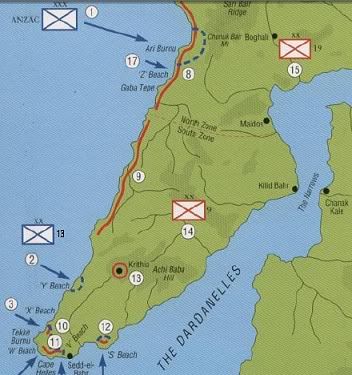
If Liman had had few time to organize his defences, Hamilton had not fared better. He had arrived to Alexandria without his staff -which had been picked by Kitchener-. Then there were not enough transport ships, so Middle East had to be scoured to find tugs, old colliers and trawlers. Worse still, reflecting the lack of manpower, the primacy of the Western Front over the rest of the threatres of war, Hamilton was to command just three divisions: the 1st Australian and the New Zaland Divisions and the 13th "Western" Division. It was argued that the Greek islands where the army was to be stationated prior to the landings were untable to keep a great army. In addition to having a clearly insufficient force to the task, the main landing-site was obvious: Bulair on Kum Kale, in the Gallipoli peninsula.
It was decided to disperse the forces over three beaches plus two diversions, that in the end became main areas of landing, too, to confuse Liman von Sanders about which one was the main landing. Ironically, the Dardanelles operation was the worst kept secret in the Eastern Mediterranean.
Thus, on April 25th, 1915...
On the north of the peninsula the Anzac troops landed at Ari Burnu. It was the least well reconnoitered of the landing beaches, and hemmed by precipitious cliffs and a terrible, inhospitable landscape. The ANZACs (1) landed from their small boats without mishap in the early dawn of April 25th and cleared the beaches by the bayonet. Then, real trouble began as they encountered impossible terrain, cliffs and gulliers covered with scrub, impossible to climb. Daylight revealed that they had landed farther north, at Ari Burnu itself and not a "Z" Beach (17), in an area so weakly defended that even isolated parties were able to progress so far as the landscape permited. Some of those parties progressed so far inland that they could actually look across the peninsula to the Narrows. However, a co-ordinated advance was impossible, and the many isolated skirmishes grew in intensity as Turkish forces arrived to the area.
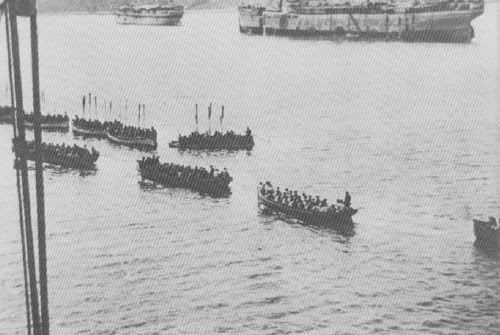
Allied troops in their boats on the morning of April 25th, 1915.
Then came Mustafa Kemal, commanding the 19th Division, which had been moving to the landing beaches since that very morning. Without authority, Kemal ordered all the forcers he could muster to attack and requested for even more of the reserve. Soon Liman von Sanders deployed the bulk of the Ottoman army in the Gallipolli peninsula against the ANZACs. The Turkish counteraatacks stabilized their positions, after bitter and gruelling fightings which lated throughtout the day and enabled the Turk to prevent the capture of the Sari Bair Ridge. Thus was decided, in the first day, the whole outcome of the campaign.
To the south, the British 13th "Western' Division (Lieutenant General Sir Stanley Maude, KCB, CMG, DSO) did not fare better. Four beaches had been selected: 'S', 'W', 'X' and 'Z' in an attempt to the Turkish defenders by surprise. The 6th Battalion, the King's Own (Royal Lancaster Regiment) landed at 'Y' Beach, which was devoid of Turkish defenders. The KORLR climbed the cliffs and then waited there, doing nothing, while their comrades were slaughtered on the other beaches, as no one send them any order to advance. Hamilton did not failed to notice the tactical significance of the beach, but he felt that he could not issue any order without the approval of the CO of the 13th Division, but Maude was fully busy with the other beaches then. When some reserves were finally commited there, it was too late.
The landing on 'W' and 'X' beaches were done following the example of the men of Albuhera, Minden, Delhi and Lucknow: 'X' beach had but twelve defenders when the 8th Battalion, the Royal Welch Fusiliers waded ashore from their boats and easily gained a lodgement. However, when they attempted to join their comrades by pushing towards 'W' beach, the Ottoman defenders in the hills directed a rain of shellfire upon them. Reinforced by the succeeding wave, (8th Battalion, the Cheshire Regiment and 4th Battalion, the South Wales Borderers), they pushed on and before dark linked up with 'W' beach.
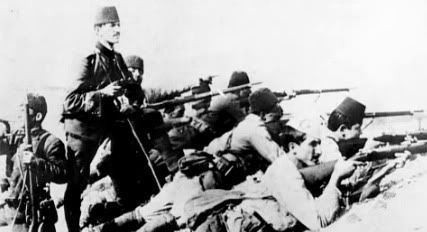
Turkish soldiers like those present in Gallipoli
There opposition had been infinitely greater, as two companies of the Turkish 2/26th Rgt defended the beach. They laid down a bararge of fire into the 7th Gloucestershire, who landed mostly in boats from Euryalis. The men wading ashore, "mown down as by a scythe", managed to struggle trough the wire, supported by the 9th Royal Warwickshire, in an operation described by Hamilton as unsurpassed in British military annals. It is noteworthy that the Turks did not open fire until the troops were actually landing; no attempt was made to strafe the unprotected boats, perhaps to avoid revealing their position and attracting shellfire from the fleet and thus losing the opportunity of trapping the British on the beach.
On 'V' beach landed the 6th Loyal North Lancashire Regiment under a storm of fire. Soon the sea at 'V' beach became red with blood as far out as fifty yards from shore and the operation was cancelled. The landing by the 6th Prince of Wales's Volunteers (South Lancashire Regiment) in 'S' Beach was accomplished with great success, proof what might have been achieved elsewhere with better planning. The batallion captured the main defences and then dug in. They repulsed several counter-attacks, supported by the covering naval bombardment. Sucess was complete.
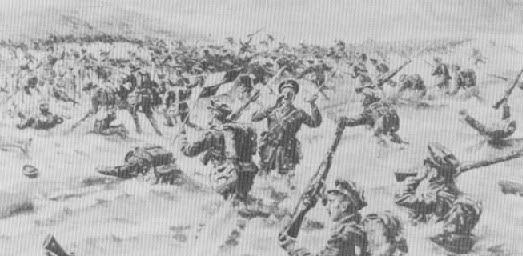
"Lancashire Landing", or how to win six Victoria Crosses in one single morning.
Despite many failings, a lodgement had been made and held. The Turks kept attacking on the following days, with such a vigour that the ANZAC forward position had been lost. Birdwood, CO of the ANZAC corps, signalled Hamilton that his position was critical and that his subordinates had advised evacuation. He replied that, for the moment, all that the ANZAC had to do was to dig, dig, dig, and "sitch it out". This order set the tone for the remainder of the campaign. By April 28th the bulk of the Allied forces were ashore, but it was clear that, in face of the Turkish attacks, further advances were out of the question. Thus, when Hamilton asked for reinforcements, he was told by Kitchener that there were no more troops to be spared. Three weeks after the landing, after the first and second battles of Krithia, the failed attempt to occupy the heights of Achi Baba, which would allow the Allied artillery to range over the entire area, it was obvious that the Dardanelles operation was stalemated.
Thus, when Hamilton reported again that he required massive reinforcements for any futher progess, an argument broke in London over the viability of the expedition. Gallipoli had proved to be no different from Flanders, and the fiasco of the two failed attacks against Krithia just worsened the situation. Worse still, after visiting the peninsula, Kitchener recommended evacuation, even if he hated the idea like sin.
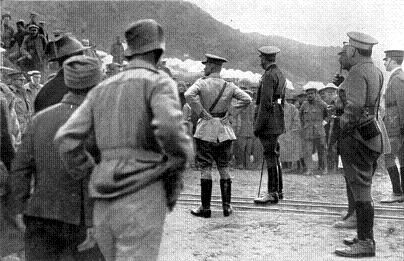
Kitchener and Birdwood seen here during K's visit to ANZAC.
Ironically the evacuation was the greatest Allied success of the campaign. Suvla and Helles were evacuated in late May. Troop numbers had been progressively reduced since early May and cunning ruses (*2) prevented the Turks that the Allies were departing. The entire Allied force was succesfully evacuated (May 13th, 1915), but large quanties of supplies and stores fell into Turkish hands. Amazingly, there were three Allied casualties during the evacuation despite the prior warnings of 50% casualties from Sir Ian Hamilton, who in and odd twist of fate, what the last casualty of the Dardanelles operation, when he was fatally wounded by a mistaken Australian sniper when he was supervising ANZAC's evacuation (*3).

General Sir Ian Standish Monteith Hamilton, GCB, GCMG, DSO, TD (1853 — 1915)
(*1) Here my Dardanelles begin to move away from OTL.
(*2) Baldrick had no part in this, thereby the success, methinks.
(*3) Even if I do not blame Hamilton for the shaemful mess that Gallipoli was, I couldn't resist commiting this bad joke to him, that I think that will amuse our Aussie mates
Last edited:

